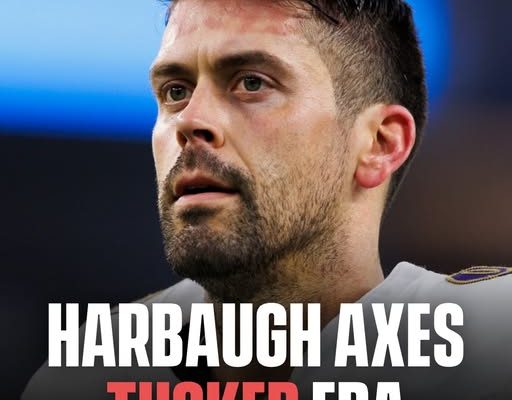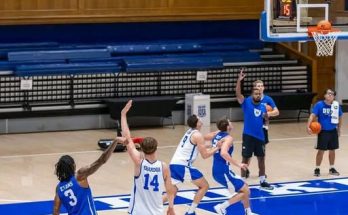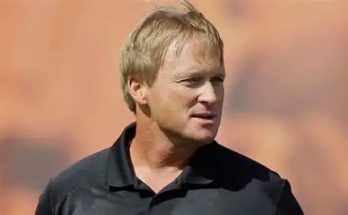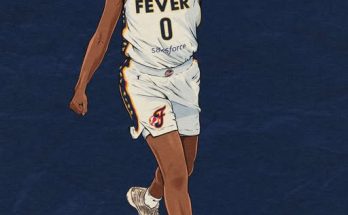The Baltimore Ravens have long been a franchise defined by consistency, culture, and cold-blooded competitiveness. From their punishing defenses to their hard-nosed leadership, they’ve been one of the NFL’s few organizations where stability at the top translated directly into winning football. But nothing lasts forever. Now, in 2025, the winds of change have swept through the franchise in a way fans have never seen before. John Harbaugh, the longest-tenured head coach in Ravens history, is stepping away. Justin Tucker, the most accurate kicker in NFL history and a cornerstone of Baltimore’s identity, is no longer donning the purple and black. What was once unthinkable has become the new reality, and Baltimore is not just turning the page—it’s burning the book and writing a brand-new one.
The departure of John Harbaugh represents more than just a change at head coach. It marks the closure of a 16-year era in which the Ravens established themselves as perennial contenders. Since taking over in 2008, Harbaugh led Baltimore to 11 playoff appearances, including a Super Bowl victory in 2012. He survived roster turnover, quarterback changes, front office retools, and shifts in offensive philosophies. No matter the turbulence, Harbaugh remained the lighthouse in the storm. His teams were always prepared, always tough, and always reflective of his fiery yet disciplined persona. But in recent years, the rumblings grew louder. Questions arose about his adaptability in the modern NFL, especially with the team’s playoff shortcomings and evolving offensive needs. The 2024 season, filled with both flashes of brilliance and painful inconsistency, felt like the end was near. And now, it is.
Equally jarring is the loss of Justin Tucker, who for over a decade was the one player Ravens fans could count on to deliver, no matter the stakes. Tucker wasn’t just a kicker—he was the kicker. The face of special teams across the league. He made 90.2% of his field goal attempts over his career and seemed immune to pressure. From 66-yard game-winners to flawless playoff performances, Tucker gave Baltimore a tactical advantage every Sunday. His absence leaves a void that statistics can’t fully capture. He was the symbol of reliability, of Ravens excellence, of “do your job” mental fortitude. And now he’s gone, leaving behind a legacy that may never be matched.
The twin departures have triggered an identity crisis that the organization is facing head-on. The message from ownership and general manager Eric DeCosta has been clear: the Ravens are not retreating into nostalgia. They’re embracing the future. That may be difficult for fans who’ve grown up with Harbaugh and Tucker as constants, but Baltimore’s front office believes the only way forward is with a clean slate. This is not a soft rebuild. This is a reinvention. A strategic leap into a new era, with bold moves that challenge the league’s perceptions of what Ravens football looks like.
A major part of that future still rests on the shoulders of Lamar Jackson. The two-time MVP quarterback has now become the elder statesman in the locker room, and the franchise centerpiece moving forward. Lamar’s evolution has been a focal point of the past few seasons. Once known solely for his breathtaking athleticism, Jackson has developed into a much more balanced quarterback, capable of dissecting defenses with his arm as much as his legs. With a new coaching staff likely to bring in an offense tailored to Lamar’s prime years, there’s an expectation that his ceiling can still rise. The Ravens are doubling down on Lamar not only as a generational talent but as a leader tasked with ushering in this new chapter.
The search for Harbaugh’s successor has already begun, and the Ravens have made it clear they are not limiting themselves to “Ravens guys.” They’re casting a wide net—from innovative offensive minds in the college ranks to respected NFL coordinators who could bring a fresh voice to the franchise. There’s even speculation that Baltimore could make a bold hire outside the box, the kind of move that would have been unthinkable under the stability-focused approach of the past decade. Whoever gets the job won’t just inherit a team; they’ll inherit a responsibility to uphold a winning tradition while adapting to a rapidly evolving league.
Similarly, the front office is retooling the roster with a forward-facing mindset. With Tucker gone, the team has already signed a rookie kicker with an absolute cannon for a leg, knowing full well they can’t replace Tucker’s accuracy but hoping to find a new special teams weapon that fits today’s game. On defense, where the Ravens have long prided themselves on physicality and depth, there’s an infusion of youth and versatility. The days of relying solely on grit are gone; Baltimore wants speed, range, and creativity. Defensive coordinator Mike Macdonald, still holding his post for now, has been given more latitude to experiment with aggressive fronts and positionless schemes.
The fans, as expected, are feeling mixed emotions. There’s grief, of course—how could there not be? John Harbaugh was more than a coach; he was a leader whose presence became synonymous with Sunday football in Maryland. Justin Tucker was more than a kicker; he was a security blanket, an icon, and a rare NFL personality who could command national respect at one of the league’s most overlooked positions. The sadness is justified. But there is also something else beginning to take root in Baltimore: curiosity. What will a Ravens team without Harbaugh’s steady hand or Tucker’s automatic leg look like? Will they be more aggressive? More unpredictable? More willing to gamble and innovate? The city, even as it mourns, is leaning forward to see what’s coming next.
It would be unfair to say Harbaugh or Tucker left the franchise in decline. On the contrary, Baltimore remained one of the AFC’s top contenders throughout their final season together. But there was a sense that the ceiling had been reached, and the only path to greater heights was through change. The Ravens have made peace with that idea. They aren’t clinging to the past. They’re not looking over their shoulder. They are, for the first time in years, walking into the unknown with intention.
Ownership’s support for this transition has also been unwavering. Steve Bisciotti’s rare public comments earlier this offseason underscored the franchise’s commitment to sustainable excellence. He spoke about not fearing change but rather fearing the complacency that comes from avoiding it. It was an unusual but telling statement—one that hinted this day was coming. In an age when many franchises are paralyzed by sentimentality, the Ravens have shown a willingness to be bold, even if it means saying goodbye to legends.
Still, there will be moments this coming season that feel surreal. Watching the Ravens trot out for a game without Harbaugh on the sideline or Tucker warming up his leg in pregame will jolt fans in ways they’re not yet prepared for. But change, especially in the NFL, is rarely gentle. It comes in waves—often swift and unforgiving—but it also brings opportunity. New leaders will rise. New heroes will emerge. And just maybe, a new identity will form that carries the same edge and excellence that made Baltimore a feared opponent for two decades.
The Harbaugh-Tucker era will go down as one of the most successful stretches in franchise history. It produced championships, unforgettable moments, and a standard that will be hard to match. But the Ravens aren’t interested in matching it—they’re aiming to exceed it. They believe their future is not just untapped, but wide open. In letting go of two of the most beloved figures in their history, they’ve sent a message to the rest of the NFL: this isn’t a rebuild. This is a rebirth.
The road ahead won’t be easy. There will be growing pains, missteps, and tough questions. But for a franchise that has always thrived on physicality, discipline, and confidence, this next era will be measured not just by wins and losses, but by how boldly they redefine what Ravens football means. The end of an era is never easy. But for Baltimore, it might just be the beginning of something even greater.



